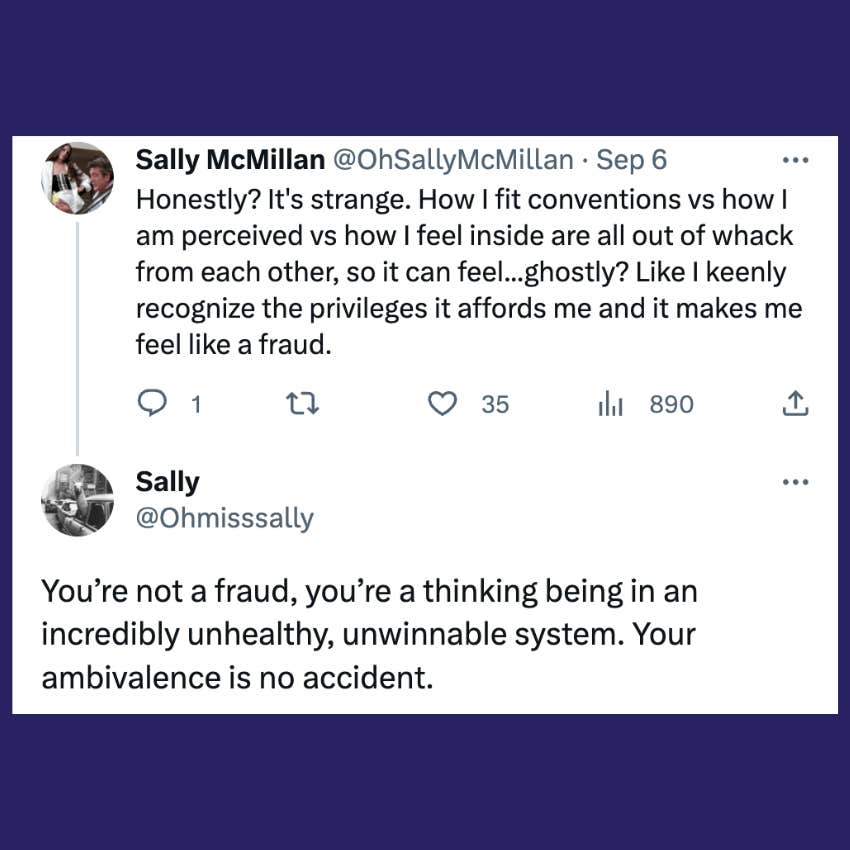Activist Wonders What It's Like To Be A 'Conventionally Attractive Thin White Woman' & The Responses She Got Are Surprising
We all know conventionally attractive people have it easier. But not in every way you might think.
 CoffeeAndMilk, twinsterphoto, Jacob Lund, Ariana Smith, NeonShot, Cristian Negroni, vanitjan, jpfotograaf, kitthanes | Canva
CoffeeAndMilk, twinsterphoto, Jacob Lund, Ariana Smith, NeonShot, Cristian Negroni, vanitjan, jpfotograaf, kitthanes | Canva There's no denying that the more privilege you have, the easier life tends to be — and there are mountains of data to prove it. But what can be easy to forget while comparing ourselves to others is that being a human being is... well, a pretty tough row to hoe for pretty much everyone. And a recent conversation on Twitter provided a rather surprising glimpse into just how true this is.
An activist wondered what it might feel like to be a conventionally attractive woman who's thin and white.
Victoria Abraham is a writer and activist whose work focuses on the life experiences of fat people and the fat phobia they often face. She recently took to Twitter, or X, to wonder aloud what it might be like to go through life in a body different from her own — one that adheres to our culture's generally accepted standards around beauty, size and race.
 Photo: @fatfabfeminist / Twitter
Photo: @fatfabfeminist / Twitter
"I genuinely don’t desire to be a conventionally attractive thin white woman," Abraham, a woman of color, wrote, "bc i am quite content with myself the way i am, but i’m [not gonna lie] sometimes I do just wonder what it’s like for them to move through the world."
She went on to say that while "everyone’s life has its own complications and challenges," when it comes to attractive, thin white women "there’s just almost a simplicity there (from the outside) that is just very fascinating to me."
Conventionally attractive women, and good-looking people in general, have been proven to have it easier in lots of ways.
Multiple studies have shown that being considered attractive makes every stage of life easier in key ways, from doing better in school to having an easier time in the job market and making higher incomes.
And like everything, what is sometimes called "pretty privilege" or "lookism" also heavily intersects with race — beauty standards are based almost exclusively on white people and white features. In fact, a 2010 study found that blond people were more likely to have a higher household income than even other white people.
But studies have also shown that being conventionally attractive also comes with pitfalls. Good-looking people are often taken less seriously in situations like job interviews and are often bullied both as children and in the workplace by those jealous of them.
Of course, the benefits of being attractive far outweigh the detriments — and that's before even taking into account the crushing impacts of all the other kinds of structural oppression and judgment people face, from racism and sexism to religious bigotry and anti-LGBTQ+ sentiment.
Still, several women responded to Abraham to express how being good-looking isn't all it's cracked up to be, and it revealed something universal about both human nature and the hierarchies we leverage against each other.
Several conventionally attractive women responded thoughtfully with ways their looks have created difficulties in their lives.
For all the benefits conferred by being on the upside of these looks-based power differentials, part of what Abraham's query ended up revealing was the ways lookism and "pretty privilege," like every other societal inequity, end up harming the people benefiting from them too.
One woman described rarely ever being taken seriously because of her looks. "No one has (at first) ever called me brilliant, creative, or artistic…it’s always about pretty," she wrote.
For others, being attractive has simply magnified their insecurities. "The outside does not match who I am inside," one bisexual woman wrote of her hyper-feminine appearance that doesn't quite accord with her own identity.
 Photo: @judyleeallen / Twitter
Photo: @judyleeallen / Twitter
Another woman expressed a similarly disorienting feeling. "How I fit conventions vs how I am perceived vs how I feel inside are all out of whack from each other, so it can feel...ghostly?" she wrote.
 Photo: @OhSallyMcMillan and @Ohmissally / Twitter
Photo: @OhSallyMcMillan and @Ohmissally / Twitter
"I keenly recognize the privileges it affords me," she went on to write, "and it makes me feel like a fraud"—which only serves to highlight what another woman called the "unwinnable" game created by the way systems of race, patriarchy and class enforce our beauty standards.
That's not to undermine how much easier and more open and more welcoming the world is to conventionally attractive white people, of course. But it does give us all the more reason to work to dismantle these oppressive systems. Because nobody escapes them unscathed — even the people placed at the top.
John Sundholm is a news and entertainment writer who covers pop culture, social justice and human interest topics.

